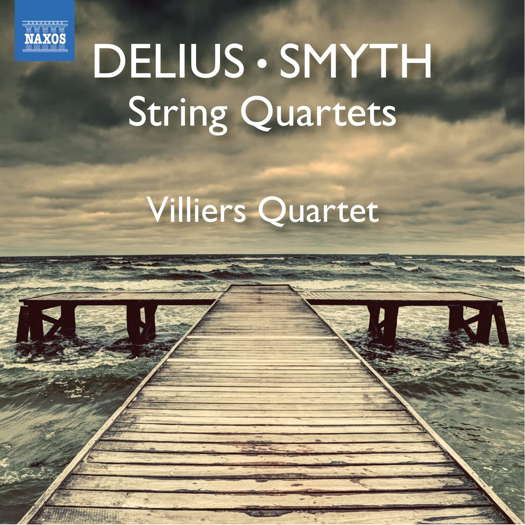 SPONSORED: Ensemble. A Great Start - Freddie Meyers' new opera A Sketch of Slow Time impresses Alice McVeigh.
SPONSORED: Ensemble. A Great Start - Freddie Meyers' new opera A Sketch of Slow Time impresses Alice McVeigh.
All sponsored features >>

Lifetime Favourites
GEOFF PEARCE listens to string quartets by Ethel Smyth and Frederick Delius
'... the recording ... is of pleasing quality.'
Both of these composers - Ethel Smyth and Frederick Delius - have been lifetime favourites of mine, and I was pleased to receive this most welcome recording as I had not heard either work before. I can remember, as a boy, reading a book about Ethel Smyth, with quite a bit featuring her own memoirs. She was certainly a larger than life character, and she led a long and interesting life. It is unfortunate that her music has taken a long time to be appreciated, but with the rise of interest in women composers generally, this is, at long last, changing.
The String Quartet in E minor was the last of six string quartets that Smyth wrote. The earlier ones were composed in the late 1870s and 80s but the one recorded here was composed between 1902 and 1912. One of the interesting things about this work is that the viola is given considerably more prominence than the instrument often receives in string quartets. At forty minutes in length, the work is quite long for a string quartet. The music itself is lush and romantic, and is an interesting work to hear as there are many changes of mood and texture.
Listen — Smyth: Allegretto lirico (String Quartet in E minor)
(8.574376 track 1, 9:04-9:45) ℗ 2022 Naxos Rights (Europe) Ltd :
The composer is very skilled, innovative and quite unique, and I think most listeners will be captured by the journey she takes us on. The work is in four movements, with the first and third being the longest. The third movement is one of the most beautiful pieces of music I have ever heard.
Listen — Smyth: Andante (String Quartet in E minor)
(8.574376 track 3, 3:31-4:18) ℗ 2022 Naxos Rights (Europe) Ltd :
The Delius String Quartet of 1888 is a four movement work and the first two movements were lost for many years before resurfacing at an auction in 2018, and the complete quartet was then edited and reconstructed by Daniel M Grimley, who is also the writer of the programme notes to this recording. This is a world first recording of the complete work. Whilst this is youthful music by a composer who had just completed two years of study at the Leipzig Conservatoire, it is also ambitious, and one can hear the voice of the later Delius that we know and love, but there is also a strong influence of Grieg present in some of the melodic passages. I find this particularly noticeable in the first movement and in the rhythmic drive of the last movement. This piece is a work well worth listening to.
Listen — Delius: Finale: Agitato, allegro (String Quartet in C minor)
(8.574376 track 8, 2:35-3:21) ℗ 2022 Naxos Rights (Europe) Ltd :
Both works are very fine and I hope they find a firm place in the repertoire. The Villiers Quartet is undoubtably a very fine ensemble indeed. The booklet accompanying the recording provides useful information and analysis without burdening the average listener with too much information, and the recording itself is of pleasing quality. Of the two works on this disc, I find the Smyth perhaps the more interesting of the two personally, but I was pleased to hear both and to hear more of the early Delius.
Copyright © 27 October 2022
Geoff Pearce,
Sydney, Australia

CD INFORMATION - DELIUS, SMYTH SRING QUARTETS



